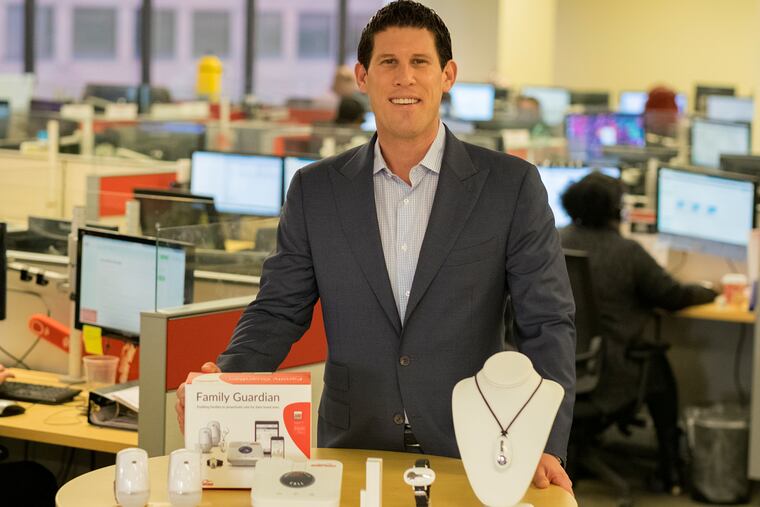A Philly firm's new service tracks an elder's movements
It knows if you've been sleeping and when you are awake. The new Family Guardian tracking service is like having an automated snoop on duty 24/7 to report if "everything's OK" with beloved seniors - or not! - says Geoff Gross, founder and CEO of Philadelphia-based Medical Guardian.

It knows if you've been sleeping and when you are awake. The new Family Guardian tracking service is like having an automated snoop on duty 24/7 to report if "everything's OK" with beloved seniors - or not! - says Geoff Gross, founder and CEO of Philadelphia-based Medical Guardian.
Developed with the Israeli tech firm Essence Group, this tracking service aims to differentiate Gross' 11-year-old monitoring company from other major players in the Personal Emergency Response Systems industry.
"We're not the biggest, but according to Inc. Magazine the fastest growing," said the 36-year-old CEO last week from his midtown Market Street base and call center. The firm had just celebrated its fourth year in a row on the "Inc. 5000" list along with two other Philly-based firms, Saxbys Coffee and Lamps.com.
The traditional emergency call button often includes cell-service connectivity, automatic fall detection, and GPS tracking options.
Family Guardian introduces more wireless gear. Its user-installed system includes occupancy sensors working with smart data crunching, sending alerts and analysis of clients' activities to caregivers' smartphones and computers.
When did Mom or Dad rise, leave, and return to the bedroom? How much time was spent in the kitchen? Did they venture out of the house? At what time and for how long?
The automated tracking "looks for normal or abnormal patterns" and makes an instant judgment call - with a text message or email "ding" to the caregiver's phone - when spotting something odd.
An emergency response-trained rep, one of the 125 staffers at 1818 Market St., will also reach out with a live phone call when sensing a problem late at night, said Gross, "like the customer leaving the house between 11 p.m. and 6 a.m.," and not quickly returning.
With 10,000 baby boomers turning 65 each day, life expectancy rising, and most seniors pushing to stay in place, there's a big market for such products.
On average, a Medical Guardian customer signs up for service at age 78. But "with one out of three seniors 65-plus taking a near-fatal fall every year," as the Centers for Disease Control and Prevention finds, Gross contends they should sign up sooner.
The global market hit $5.6 billion in 2015 and is poised to reach $8.6 billion by 2022, Stratistics Market Research Consulting found.
Some competitors, like market leader Philips Lifeline and ADT LLC, have been moving to "telemedicine," enhancing the panic button with proactive monitors that track blood pressure, congestive heart failure, weight, diabetes, oxygen levels for COPD, hypertension, asthma, and medical compliance (pill-taking).
But Gross, whose family used to run Tri-State Alarm, suggests telemedicine tech is not ready for prime time and, after much research, believes "we've got the most desirable features" for seniors and the 42 million grown children caring for elders.
Being pitched in cable TV commercials (with Florence Henderson as spokeswoman) and online, Family Guardian's service is also about reducing the demands on caregivers "who now feel compelled to check on their parents four times a day and suffer lots of stress as a consequence. It's epitomized by their 29 percent increased use in antianxiety" drugs, Gross said.
As the CEO sees it, this $79.95-a-month service "is less than the cost of a single day visit from a paid caregiver," and a drop in the bucket "next to the $3,000 a month average cost for assisted living."
215-854-5960@JTakiff